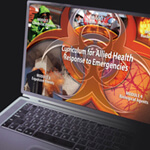
You are on your normal shift when you hear from a couple of your patients that an “18-wheeler” has overturned less than a mile from your clinic. They tell you that it was carrying chemicals and that the chemicals are leaking out of the tanker. It is a very windy day and when you go outside, you notice a strange smell in the air. What do you do?
This is an example taken from one of the scenarios students in the School of Allied Health Sciences study to identify chemical agents in the event of a disaster, and is part of the Texas Curriculum for Allied Health Response to Emergencies (C.A.R.E.s) Curriculum Development Project. Of the 13 universities in the nation that received federal funding for bioterrorism curriculum development, the Health Science Center and the University of Nebraska were the only two that received grants specifically for allied health programs. The Health Science Center’s $1.1 million grant not only includes the Web modules on terrorism, but also volunteer responder electives and Community Emergency Response Team training.
“All allied health professionals are vital to disaster response,” said Marilyn S. Harrington, Ph.D., dean of the School of Allied Health Sciences and principal investigator of the project. “This curriculum was designed to give them the skills, knowledge and abilities to increase victims’ chances of survival.”
Twelve Web-based courses for 18 different allied health disciplines, including nutrition/dietetics, clinical laboratory sciences, dental auxiliary programs and radiologic sciences, were developed by 60 allied health faculty members at the Health Science Center, Amarillo College and The University of Texas Southwestern Medical Center at Dallas through the Texas C.A.R.E.s Curriculum Development Project. For the next two years, visitors to the School of Allied Health Sciences Web site, www.uthscsa.edu/sah, can utilize the Curriculum for Allied Health Response to Emergencies at any time, free of charge.
“Clearly, San Antonio has an extra cache of people who are better trained,” said Eric Epley, executive director of the Southwest Texas Regional Advisory Council for Trauma (STRAC) and director of the Regional Medical Operations Center (RMOC). “Everyone has to be on the same sheet of music for an effective response to occur. Having additional health care professionals with these skills is invaluable.”

